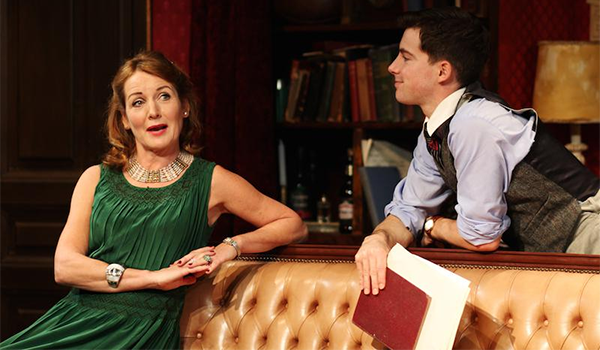First Episode (Jermyn Street Theatre)

© Flavia Fraser-Cannon
Amazing, really, that Terence Rattigan‘s first performed play – co-written with a fellow Oxford undergraduate, Philip Heimann, with whom he was infatuated – has not been seen in London since its West End premiere in 1934.
As a prentice piece it’s more than interesting, though Tom Littler‘s unevenly acted production plays straight down the middle of its silly ass, faux-stylish pretensions as a play about mis-cued love among the privileged undergrad classes, with incursions from the "real" world of show business.
The result is a slightly annoying experience with a large element of "so what" if Gavin Fowler‘s languid Tony beds the visiting femme fatale – Caroline Langrishe is a suitably exotic Margot Gresham, the film star hired as Cleopatra in the OUDS student showpiece – while Philip Labey‘s prim little curly-lipped David Lister (nothing like his Independent arts editor namesake) pants hotly on the side-lines.
Tony and David share lodgings with a goggle-eyed Bertie Arnold (the Max Adrian role taken ravenously by Adam Buchanan) and a beanpole stooge, Philip Kahn (Alex Hope); they fill in a faint air of Charley’s Aunt jolly Oxonian japes stiffening into a steady wind with the arrival of Molly Hanson‘s skittish good-time girl Joan Taylor.
Hanson’s is easily the most enjoyable, least forced performance in the play, as she darts between drinks and dalliance in the boys’ sitting room and a thick-headed morning-after in the King’s Head hotel.
The Lord Chamberlain and the self-appointed Public Morality Council kicked up a fuss about the loose stays and values of the play, and its homosexual undercurrents; but everyone else, on both sides of the Atlantic (the play went to the little Ritz Theatre in New York), knew that boys will always be boys and girls will always have fun.
Rattigan was writing from real experience, and the play is at least a valuable documentary record of times when high-flying professionals often came to Oxford student theatre; Peggy Ashcroft played an OUDS Juliet in 1932, directed by Gielgud, in which a student Rattigan played a small part, just as producers Cameron Mackintosh and Thelma Holt work with the undergrads today.
This clash of prestige and amateurism is stirred in Margot’s absurd affair with Tony. The play also memorialises a time when scraping by with a poor degree was the done thing; nothing mattered as much as a good party, bad behaviour (authorised, almost, by the ridiculous university Proctors, splendidly guyed by Harry Gostelow, doubling as a supine butler) or a betting shop flutter on the Derby, a passage that is one of Rattigan’s most vivid, and most vividly written.
First Episode runs at the Jermyn Street Theatre until 22 November.










